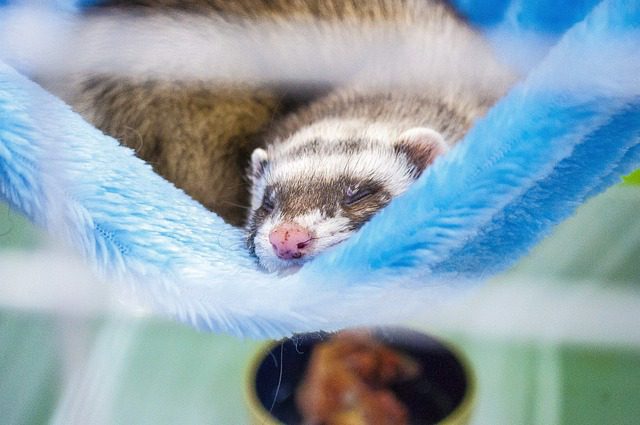13 Potential Signs A Ferret Is Dying With Tips

Let’s discuss the common signs a ferret is dying…
We all know how important it is to spot the signs when our furry friends aren’t feeling their best.
So, in today’s blog post, we’re going to dive into the delicate topic of ferret health and discuss the telltale signs that indicate your ferret may be nearing the end of their journey.
Let’s get started!
Signs A Ferret Is Dying
Signs that a ferret may be dying include a decrease in appetite, lethargy, difficulty breathing, weight loss, weakness, and disinterest in their usual activities.
If you notice any of these symptoms, it is crucial to seek immediate veterinary care to determine the cause and provide appropriate treatment.
Let’s break it down further…
The following are some of the most common signs a ferret is dying:
1. Drastic Changes in the Ferret Body Temperature
Signs of a dying ferret can include drastic changes in their body temperature. A ferret that is dying may experience hypothermia or hyperthermia. Hypothermia is a condition where the body temperature drops below normal, while hyperthermia is when the body temperature rises above normal.
If you notice that your ferret feels extremely cold or hot to the touch, it could be a sign that their body temperature is not within the normal range. Monitoring your ferret’s body temperature using a thermometer can help you determine if there are any drastic changes.
It’s important to note that changes in body temperature can be caused by various underlying health conditions, so it’s crucial to consult a veterinarian for a proper diagnosis and treatment plan if you suspect your ferret is experiencing drastic changes in body temperature.
2. Difficulty Walking or Standing
Another sign that a ferret may be dying is difficulty walking or standing. As ferrets age or become ill, they may experience weakness or loss of muscle control, making it challenging for them to move around. They may struggle to maintain balance, stumble, or even collapse.
If you notice that your ferret is having difficulty walking or standing, it’s important to seek veterinary attention as soon as possible. Difficulty with mobility can be a symptom of various health issues, including neurological disorders, musculoskeletal problems, or organ failure.
A veterinarian can conduct a thorough examination and recommend appropriate treatment options based on the underlying cause of your ferret’s mobility issues.
3. Labored or Difficulty Breathing
Labored or difficulty breathing is another concerning sign that a ferret may be dying. If your ferret is struggling to breathe or shows signs of respiratory distress, such as rapid or shallow breathing, wheezing, coughing, or gasping for air, it could indicate a serious health problem.
Respiratory issues in ferrets can be caused by a range of conditions, including infections, pneumonia, heart disease, or tumors. Prompt veterinary attention is crucial to diagnose the underlying cause and provide appropriate treatment to alleviate your ferret’s breathing difficulties.
4. Sleeping More Than Usual
An increase in sleeping or lethargy can also be a sign that a ferret is dying. If you notice that your ferret is sleeping more than usual and lacks interest in their surroundings or activities, it could indicate a decline in their overall health.
Ferrets are naturally active and curious animals, so a sudden and significant decrease in their activity level is cause for concern. Lethargy can be a symptom of various health issues, including infections, organ failure, or systemic diseases.
If your ferret is displaying signs of excessive sleepiness or lethargy, it’s crucial to consult a veterinarian for a thorough examination and appropriate treatment options.
5. Drastic Weight Loss
One of the signs that a ferret may be dying is drastic weight loss. Ferrets are typically energetic animals that maintain a healthy weight.
However, when a ferret is nearing the end of its life, it may experience a significant decrease in appetite and start losing weight rapidly. This can be a result of various underlying health issues or old age.
Possible causes of drastic weight loss in a dying ferret:
- Chronic illness: Ferrets with chronic illnesses, such as adrenal disease or insulinoma, may experience weight loss as their condition deteriorates.
- Lack of appetite: As a ferret nears the end of its life, it may lose interest in eating and become weaker, leading to weight loss.
- Digestive issues: Digestive problems, such as gastrointestinal tumors or bowel obstructions, can cause weight loss in ferrets.
6. Lethargy and Weakness
Lethargy and weakness are common signs that a ferret is nearing the end of its life. As the ferret’s health declines, it may become increasingly fatigued and have difficulty moving around. The ferret may spend more time sleeping and show little interest in activities it once enjoyed.
Possible causes of lethargy and weakness in a dying ferret:
- Organ failure: When a ferret’s organs start to fail, it can lead to weakness and lethargy.
- Pain or discomfort: Chronic pain or discomfort can cause a ferret to become lethargic and lose interest in its surroundings.
- Decreased energy reserves: As a ferret’s health declines, its body may struggle to maintain energy levels, resulting in lethargy.
7. Change in Appetite
A change in appetite is another sign that a ferret may be dying. A ferret approaching the end of its life may experience a loss of appetite or a significant decrease in food intake. This can be due to various factors, including underlying health issues or a general decline in the ferret’s overall well-being.
Possible causes of a change in appetite in a dying ferret:
- Nausea or pain: Ferrets that are experiencing discomfort or pain may lose their appetite.
- Metabolic changes: As a ferret’s body shuts down, its metabolism may slow down, resulting in a decreased appetite.
- Oral health issues: Dental problems or oral tumors can make it difficult for a ferret to eat, leading to a change in appetite.
8. Unusual Discharge
Unusual discharge from the ferret’s body can also be a sign that it is nearing the end of its life. This can manifest as discharge from the eyes, nose, ears, or genital area.
The discharge may be accompanied by other symptoms, such as a foul odor or a change in color or consistency.
Possible causes of unusual discharge in a dying ferret:
- Infection: Infections can cause discharge from various parts of the ferret’s body.
- Organ failure: As a ferret’s organs fail, it can lead to abnormal fluid accumulation and discharge.
- Tumor growth: Tumors, especially in the reproductive system, can cause abnormal discharge in ferrets.
9. Drastic Changes in Stool
One of the signs that a ferret may be dying is drastic changes in their stool. This can include diarrhea, constipation, or the presence of blood in the stool.
These changes may be a result of underlying health issues or organ failure. It is important to monitor the ferret’s stool and consult a veterinarian if you notice any abnormal changes.
10. Loss of Fur
Another sign of a dying ferret is the loss of fur. A healthy ferret will have a shiny and thick coat. However, when a ferret is nearing the end of its life, it may experience fur loss or thinning.
This can be due to a variety of factors, including age, illness, or stress. If you notice significant fur loss in your ferret, it is important to seek veterinary attention.
11. Hiding or Seeking Solitude
Ferrets are social animals and typically enjoy being around their human companions or other ferrets. However, when a ferret is dying, it may exhibit a behavior change and seek solitude.
This can include hiding in dark corners, refusing to interact, or isolating itself from its usual environment. These changes in behavior can be a sign that the ferret is not feeling well and may be nearing the end of its life.
12. Unusual Dehydration
Dehydration is a serious condition that can occur in a dying ferret. It can be caused by various factors, such as refusing to eat or drink, underlying health issues, or organ failure.
Signs of dehydration in a ferret may include dry gums, sunken eyes, lethargy, and poor skin elasticity. If you suspect your ferret is dehydrated, it is important to seek immediate veterinary attention.
13. Vomiting and Diarrhea
Vomiting and diarrhea are common symptoms in a dying ferret. These symptoms can be caused by a variety of issues, including gastrointestinal problems, infection, or organ failure.
If your ferret is experiencing frequent vomiting or diarrhea, it is important to consult a veterinarian for proper diagnosis and treatment.
Read more about identifying a sick ferret.
When to Contact a Vet About Your Dying Ferret
When your ferret is nearing the end of its life, it’s important to contact a vet for guidance and support.
Signs that may indicate your ferret is dying include difficulty breathing, extreme lethargy, loss of appetite, and a decline in mobility.
It’s crucial to reach out to a vet to discuss your ferret’s condition and determine the best course of action.
They can provide advice on pain management, and palliative care, and help ensure your ferret’s comfort in its final moments.
How to Take Care of a Dying Ferret
Taking care of a dying ferret requires both compassion and practicality. Firstly, it’s essential to create a comfortable and quiet environment for the ferret, providing warm and soft bedding.
Secondly, monitor their hydration levels and offer small amounts of water frequently, using a syringe if necessary.
Thirdly, offer easily digestible and nutritious food, such as baby food or a special diet recommended by a veterinarian.
Lastly, spend quality time with the ferret, providing gentle comfort and reassurance during their final days.
How to Comfort a Dying Ferret
Comforting a dying ferret can be a challenging and emotional experience. It’s important to provide them with as much comfort and support as possible during this difficult time.
Here are some ways to comfort a dying ferret:
Create a peaceful environment: Ensure that the ferret is in a comfortable and quiet space where they can rest undisturbed. Dim the lights and minimize any loud noises or disruptions that might cause stress or discomfort.
Offer physical comfort: Gently stroke the ferret or hold them close if they are comfortable with it. Physical contact can provide reassurance and help them feel loved and secure.
Provide warmth: Keep the ferret warm by providing a soft blanket or a heated pad. A warm and cozy environment can help them feel more comfortable.
Offer familiar scents: Place familiar items, such as their favorite blanket or toy, near the ferret. These scents can provide a sense of security and familiarity during their final moments.
Stay calm and soothing: Your presence and demeanor can have a significant impact on the ferret’s comfort. Speak in a calm and soothing voice, providing reassurance and comfort through your presence.
Monitor their needs: Pay attention to the ferret’s physical needs, such as ensuring they have access to water and food if they are able to eat. However, please consult with a veterinarian regarding their specific dietary requirements during this time.
Consider veterinary support: If you’re unsure about how to provide the best care for a dying ferret or if their condition worsens, it is essential to consult with a veterinarian. They can offer guidance and support, ensuring that your ferret’s comfort and well-being are prioritized.
Remember, every ferret is different, and their preferences and needs may vary. It’s crucial to be sensitive to their individual needs and provide the comfort and support that works best for them.
Read more about some common health conditions in ferrets.
How to Cope With the Death of Your Ferret
Losing a beloved pet can be a deeply emotional and challenging experience. Coping with the death of a ferret requires time, patience, and self-care.
Here are a few suggestions on how to cope with the loss:
- Allow yourself to grieve: It’s important to acknowledge and honor your feelings of grief. Give yourself permission to feel sad, cry, and express your emotions. Understand that it is normal to feel a sense of emptiness and loss after losing a cherished pet.
- Seek support: Reach out to friends, family, or support groups who can provide comfort during this difficult time. Sharing your feelings and memories with others who understand the bond between humans and animals can be immensely healing.
- Preserve memories: Create a memorial or tribute for your ferret. This could include making a scrapbook, framing a photo, or planting a tree in their honor. Celebrate the love and joy your furry friend brought into your life by preserving their memory in a special way.
- Take care of yourself: Grief can be physically and emotionally draining. Make sure to prioritize self-care by eating well, getting enough sleep, and engaging in activities that bring you comfort and solace. Allow yourself time and space to heal.
- Consider a support network: If you find yourself struggling with the loss for an extended period, it may be helpful to seek professional help. Pet loss support groups or therapy can provide guidance and support during the grieving process.
- Consider a new pet: While it’s important to take the time to grieve and heal, eventually you may feel ready to open your heart to another pet. When the time is right, consider adopting or rescuing another ferret or a different pet that brings you joy. Remember, this decision should be made when you feel emotionally ready and not as a way to replace your lost companion.
Remember that everyone copes with loss differently, so give yourself the time and space to heal at your own pace.
Your ferret will always hold a special place in your heart, and as time passes, your memories of them will bring more comfort than pain.
Frequently Asked Questions
How can I tell if my ferret is dying?
There are several signs to look out for that may indicate that your ferret is nearing the end of their life. These signs include extreme lethargy, loss of appetite, difficulty breathing, unresponsiveness, and noticeable weight loss. If you notice any of these symptoms, it’s crucial to seek veterinary assistance as soon as possible.
Is it normal for ferrets to sleep a lot, or could it be a sign of their decline?
Ferrets are known for their playful and energetic nature, so if you notice a significant increase in their sleeping habits, it could be a cause for concern. While it’s true that ferrets do require a good amount of sleep, excessive exhaustion or a sudden change in their sleep patterns might indicate underlying health issues, including the possibility of them nearing the end of their life.
Can the loss of appetite be a sign of a dying ferret?
Yes, a loss of appetite is often one of the telltale signs that a ferret may be dying. Ferrets are known for their voracious appetites, so if you notice a sudden disinterest in food or a significant decrease in their eating habits, it’s crucial to consult with a veterinarian to determine the cause and appropriate course of action.
What should I do if my ferret is having trouble breathing?
Difficulty breathing in ferrets can be a serious symptom that requires immediate attention. If you notice your ferret struggling to breathe, panting excessively, or making unusual sounds while breathing, it’s important to seek veterinary care right away. Breathing issues can be a sign of various health conditions, including those that may be life-threatening.
Is weight loss always a sign of a dying ferret?
While weight loss can be a symptom of a dying ferret, it’s important to consider other factors as well. Ferrets can experience weight fluctuations due to various reasons, such as changes in diet, stress, or illness. However, if you notice a sudden and significant weight loss, coupled with other concerning symptoms, it’s crucial to consult with a veterinarian to determine the underlying cause.
What can I do to provide comfort for my dying ferret?
When it comes to providing comfort for a dying ferret, it’s essential to focus on their well-being and quality of life. Ensure they have a quiet and peaceful environment, provide soft bedding for their comfort, and offer easy access to food, water, and litter boxes. Spending time with them, gently stroking or cuddling if they’re receptive, can also provide emotional support during this difficult time. Additionally, consulting with a veterinarian for palliative care options or pain management can help ease any discomfort your ferret may be experiencing.
Conclusion
In conclusion, when it comes to recognizing signs that a ferret is dying, trust your instincts and pay close attention to their behavior and physical condition.
Remember, early detection is key, so don’t hesitate to consult with a veterinarian if you notice any concerning changes.
By being proactive and providing the best care possible, you can ensure your furry friend has a comfortable and happy life. Stay vigilant and cherish every moment with your beloved ferret!


![Ferret Depression [Signs, Causes & Solutions] Ferret Depression](https://petcreeks.com/wp-content/uploads/2023/12/ferret-2194028_1280-768x510.jpg)

![Ferret Whimpering [Causes & How To Respond] Ferret Whimpering](https://petcreeks.com/wp-content/uploads/2023/12/ferret-1970169_640.jpg)
![How Do I Know If My Ferret Is In Pain [See 11 Signs] How Do I Know If My Ferret Is In Pain](https://petcreeks.com/wp-content/uploads/2023/12/ferret-660546_1280-768x576.jpg)
